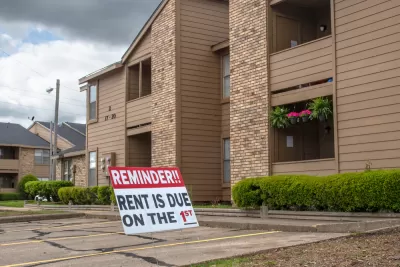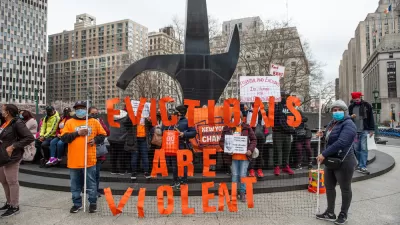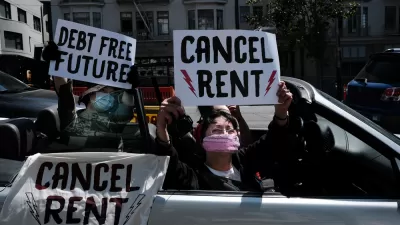With the federal eviction moratorium due to expire at the end of the month and rent relief programs failing to reach those who need it most, an eviction crisis still looms.

[Updated June 14], 2021] Chris Arnold reports on the new confluence of pressures on the nation's renters as the pandemic recedes even as the economic destruction lingers.
The article reports the number of U.S. renters falling behind on payments and at risk of eviction—a figure Planetizen has been monitoring since the outset of the pandemic and the economic shutdown that followed closely on the heels of COVID-19 to U.S. shores.
The most recent data from the U.S. Census Bureau estimates the number of Americans behind on rent at 7 million. That current figure is all the more pressing due to the scheduled expiration of the eviction moratorium by the Centers for Disease Control and prevention at the end of the month—a measure of protection despite legal setbacks and threat of expiration (the moratorium has already been extended on several occasions).
As shared on Planetizen in May, the federal government's large allotments of rent relief during the pandemic are arriving too late because of bureaucratic logjams. Arnold's article starts with an anecdote from a renter experiencing exactly this scenario and explores the consequences of the inefficiency of rent relief during the pandemic.
FULL STORY: Millions Could Face Eviction With Federal Moratorium Ending And A Logjam In Aid

Planetizen Federal Action Tracker
A weekly monitor of how Trump’s orders and actions are impacting planners and planning in America.

Chicago’s Ghost Rails
Just beneath the surface of the modern city lie the remnants of its expansive early 20th-century streetcar system.

San Antonio and Austin are Fusing Into one Massive Megaregion
The region spanning the two central Texas cities is growing fast, posing challenges for local infrastructure and water supplies.

Since Zion's Shuttles Went Electric “The Smog is Gone”
Visitors to Zion National Park can enjoy the canyon via the nation’s first fully electric park shuttle system.

Trump Distributing DOT Safety Funds at 1/10 Rate of Biden
Funds for Safe Streets and other transportation safety and equity programs are being held up by administrative reviews and conflicts with the Trump administration’s priorities.

German Cities Subsidize Taxis for Women Amid Wave of Violence
Free or low-cost taxi rides can help women navigate cities more safely, but critics say the programs don't address the root causes of violence against women.
Urban Design for Planners 1: Software Tools
This six-course series explores essential urban design concepts using open source software and equips planners with the tools they need to participate fully in the urban design process.
Planning for Universal Design
Learn the tools for implementing Universal Design in planning regulations.
planning NEXT
Appalachian Highlands Housing Partners
Mpact (founded as Rail~Volution)
City of Camden Redevelopment Agency
City of Astoria
City of Portland
City of Laramie




























